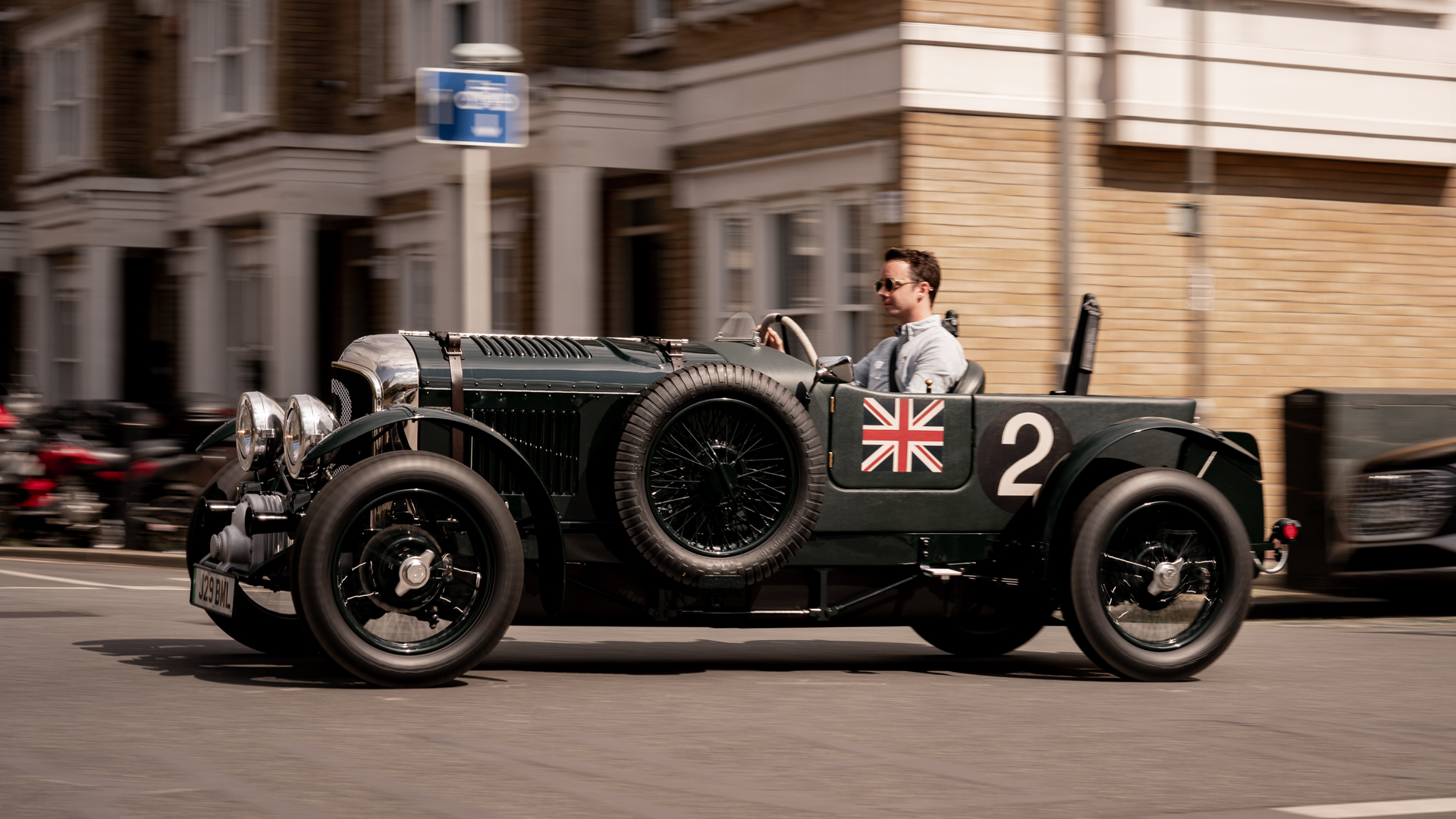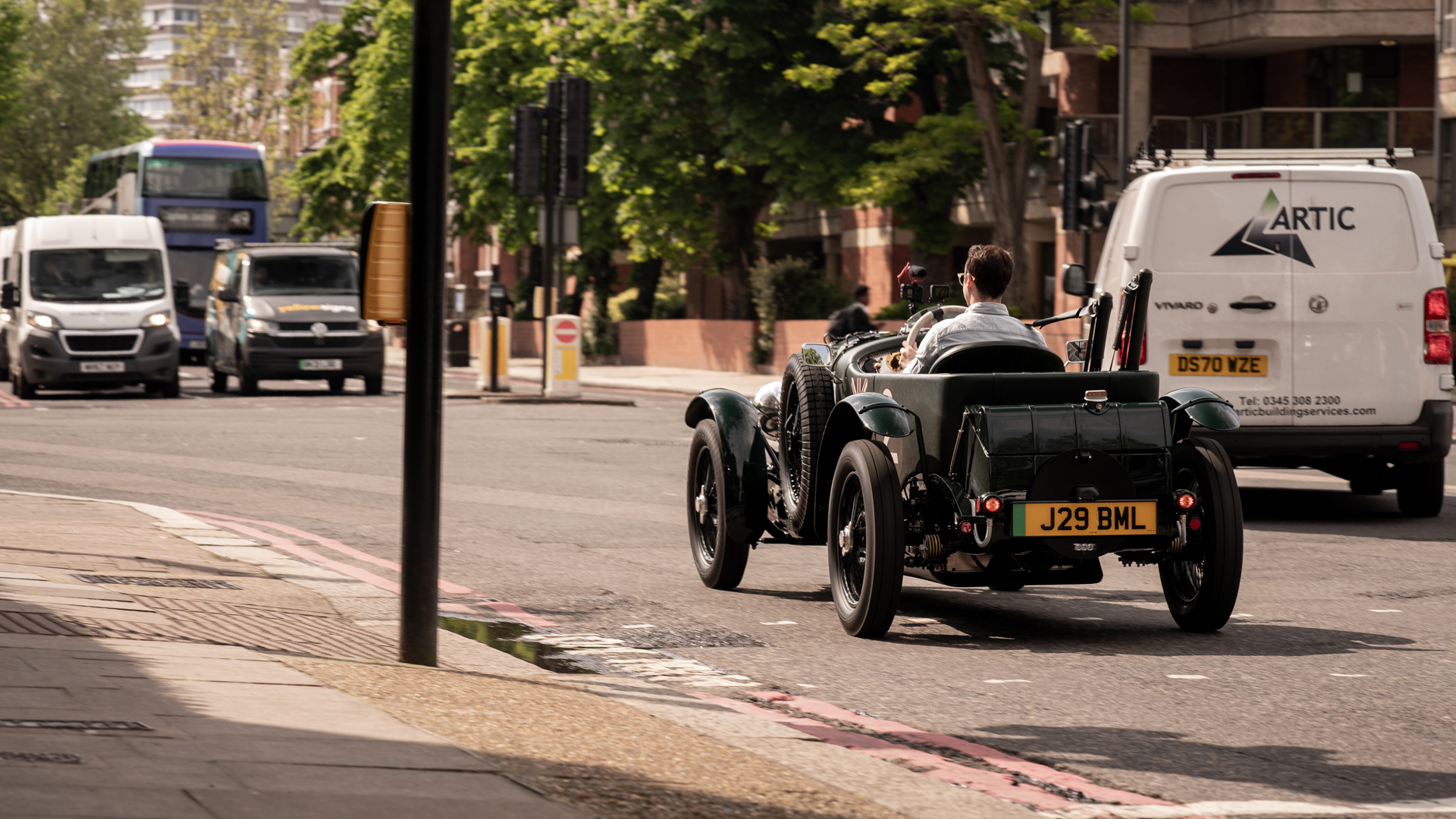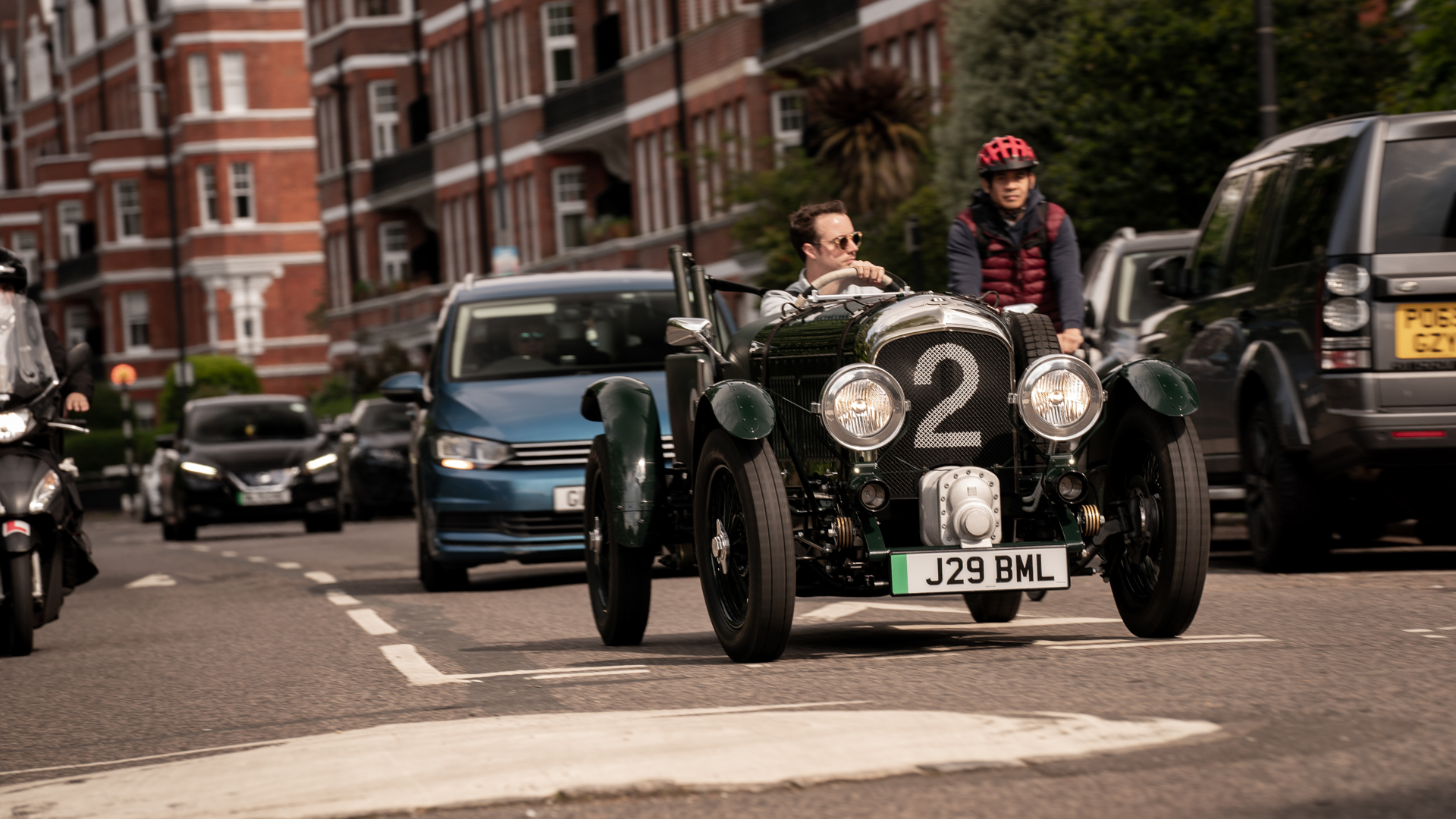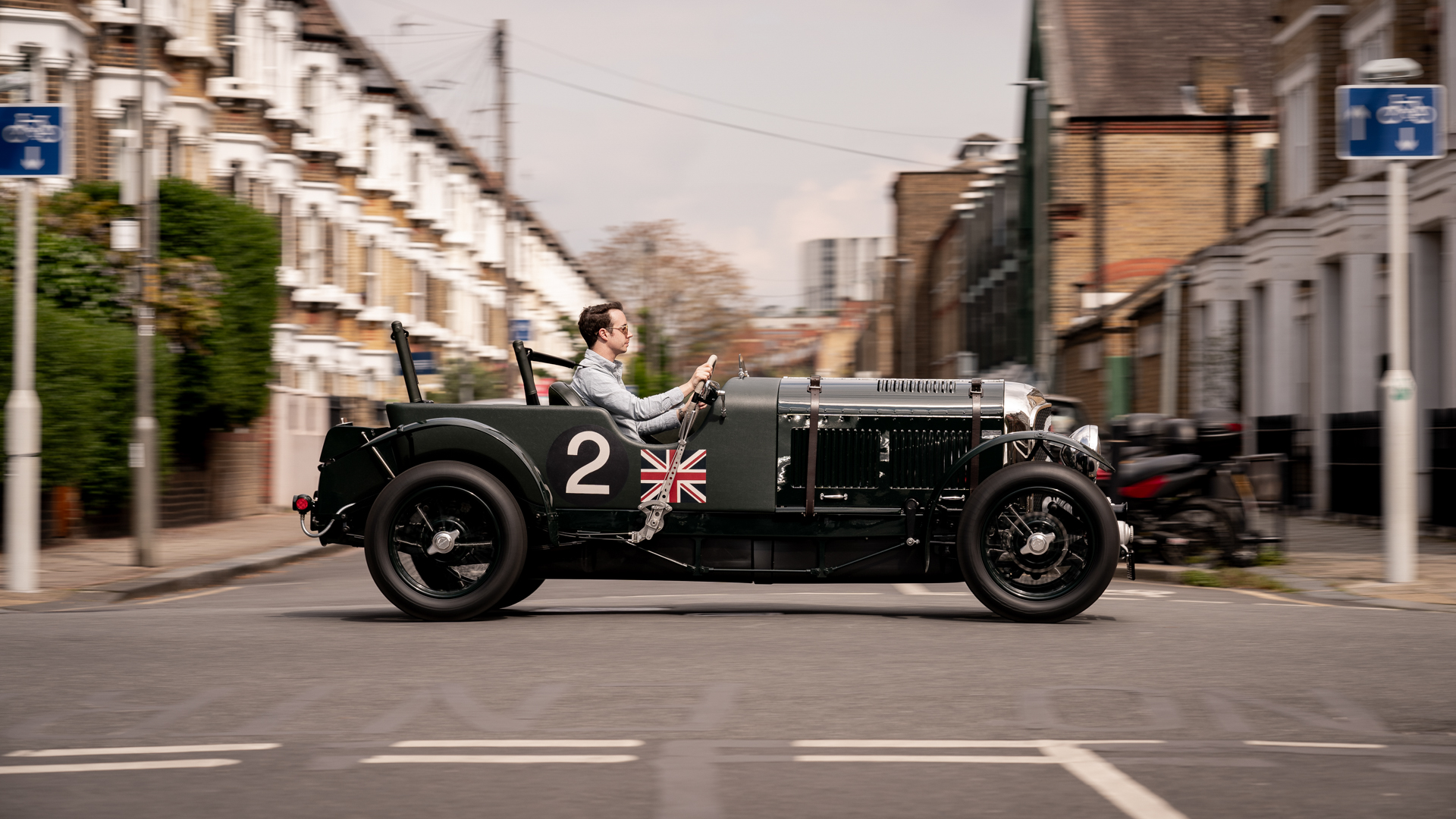
The roads of South West London are no stranger to rare and exotic cars. Spend more than just a few minutes trundling along the Kings Road or weaving through the quieter streets of old Chelsea, and you’ll quickly lose count of how many impressive vehicles are out and about. Supercars, classics, racers. In just a square-mile or so you’ll see the lot.
This means locals rarely look twice when I’m fortunate enough to cruise by in an interesting press car. Supercars barely get a second look, and even the utterly gorgeous Mini eMastered I drove last year failed to cause much of a stir.
Not so, the Bentley you see here. To the causal observer – and perhaps even the enthusiast missing their glasses – this is a pre-war Bentley race car. A 4.5-liter Blower from 1929 to be precise, complete with its supercharger sprouting from the front of the engine bay.
Only it isn’t that at all. It’s called the Bentley Blower Jnr, it’s electric and it’s brand new. Made on behalf of Bentley by Oxfordshire-based The Little Car Company, it is a faithful 85% replica of the original, fully road-legal in the UK, US and Europe, and with seating for two in a one-plus-one formation. A single motor sends about 20 horsepower to the rear wheels and batteries in the floor provide a top speed of 45 mph (or 25 mph in the US due to differing regulations). Range is about 65 miles. Technically it’s a quadricycle, but so long as you have a full valid driving licence, it’s basically an electric car too.

And boy, does it turn heads. Even the Battersea and Chelsea locals, who wouldn't normally look up for anything less than a Bugatti Chiron, crossed the road to for a closer inspection. Passing taxi drivers shouted questions, pedestrians queried the Bentley’s age and one rollerskating gentleman insisted I tow him along the road for a photo. All were in awe, first at the sight of a 1920s Bentley, then by the fact this one is actually a box-fresh EV. They were probably also amused at how my six-foot-plus photographer had managed to fold himself into the compact rear seat.
The Blower Jnr is fully licensed by Bentley, in the same way The Little Car Company’s catalogue also includes factory-approved, scaled-down and electric versions of the Bugatti Type 35B, Aston Martin DB5 and Ferrari 250 Testa Rossa. But the Bentley is far more ambitious than its stablemates, because this the first TLCC vehicle to be road legal. That’s why it has seat belts. And while their mounting posts slightly spoil the aesthetics, points are more than earned back with the authentic leather upholstery – as used by Bentley’s own run of full-size Blower Continuation cars –, the rope-bound steering wheel, accurate external parking brake, hand-painted Union flags and beautiful turned aluminium dashboard.

As with other TLCC products, nothing is fitted for aesthetics alone. The dashboard may look original, but all of its dials and controls have been repurposed for the Blower Jnr’s electric drivetrain. The only obvious giveaway inside, apart from the seat belts, is the small digital display that is necessary to satisfy quadricycle regulations, since the vehicle needs to indicate when it’s live. It shows a vintage clock, but could be used with a rear parking camera if one were fitted.
What was the fuel tank is now a lockable and surprisingly accommodating boot. What was the supercharger is now, appropriately enough, where the Blower Jnr plugs in for a recharge. The enormous bonnet is mostly empty, which looks a bit odd when you catch a glimpse through the vents, but could be used as additional storage. I say “could” because this is a pre-production prototype and TLCC is still working on the final details.
Driving the Bentley Blower Jnr

I haven’t driven an original Blower, but I’ve been lucky enough to ride as a passenger in a Bentley Straight Six of a similar vintage. Naturally there’s no thundering engine this time, but the Blower Jnr still rides in a broadly similar way to its ancestors. The slow steering needs more work than in a modern car and, while the seat is surprisingly comfortable, the suspension doesn’t really know what to make of London’s industrial-sized speed bumps. I left the seat more than once, but soon learnt to slow down and rely on the patience of those following.
Speed bumps cleared, and the Blower Jnr is plenty quick enough to keep up with city traffic in London’s 20 and 30 mph zones. I even managed a brief stretch of dual-carriageway, where the Blower Jnr made me feel less vulnerable than a low-slung Caterham would have. That shouldn’t be surprising, since the original Blower was so big that at 85% the Jnr is only around 20 cm narrower and shorter than a new Mazda MX-5.
There are no official acceleration figures, but in traffic it felt broadly on par with the aforementioned Mini eMastered, and the Blower Jnr’s big enough to stop other drivers from overtaking unnecessarily. I’d worried that maybe it would feel like a mobility scooter and I’d be battling with cyclists, but in reality its proportions feel just like any other small car.

A small concession to the quadricycle laws means the Blower Jnr only has a very small semicircle of a windscreen. It’s smaller than what 85% of the original would look like, but the rules mean that if it were any larger it would have to function as a proper windscreen, complete with powered wipers. Instead, drivers are urged to wear sunglasses or, better still, period-correct goggles.
Otherwise it really is a doddle to drive; there’s a key fob that automatically disables the immobiliser when close by, then you enter via the one opening door, adjust the seat and mirrors, press the start button and shift to Drive with a lever on the dashboard. Release the beautiful aluminium hand brake, press the accelerator and away you go.
There are three drive modes, but you’re best leaving it in the hottest setting unless you’re letting a younger driver have a go (on private land of course). The Blower Jnr quickly gets up to speed and stops almost as quickly; the brake pedal needs a firm shove, like that of a kart or indeed a classic car, but the brakes – sourced from a Ducatti motorbike – do a fantastic job. There’s a toggle switch for the indicators, a button for the hazard lights and a button on the foot rest for sounding the horn. It all strikes a fine balance between practical and eccentric, but is quick to learn and after just a few minutes of mild terror on a busy two-lane road, I’m loving the Bentley Blower Jnr.

It has a more relaxed demeanour than TLCC’s racier (and significantly lighter) Ferrari Testa Rossa J, but is also far more comfortable than the Bugatti Baby II. It’s a more grownup car and inherently a more responsible one given its road legality.
You’ll notice I haven’t mentioned the price. Truth is, it doesn’t really matter. The Little Car Company has unearthed a customer base who are fabulously wealthy and aren’t sizing up their next purchase against the competition. Many customers own several and some even own all of TLCC’s cars, and when a new one is announced they quickly place an order.
I’m stalling, aren’t I? Ok, fine. It’s £90,000. Yes I know you can buy a lovely new Porsche for that, or indeed a second-hand modern Bentley for a fair bit less. But that isn’t the point. TLCC’s customers aren’t seeking out an attractive finance deal or haggling over the price of paint. They’re probably sticking it on a credit card and, truth be told, many are buying these miniature vehicles as art rather than mobility.
So yes, it’s incredibly expensive. But another way to look at it is, it’s about as pricey as The Little Car Company’s Ferrari, yet can be driven on the road. This transforms it from a very nice plaything forbidden from venturing beyond the driveway, into a very nice car. A real, actual car. On a summer’s afternoon, I can think of no better way of pottering around town or going to the pub. Heck, I bet customers in warmer climes will use theirs for the daily commute. I know I would.







